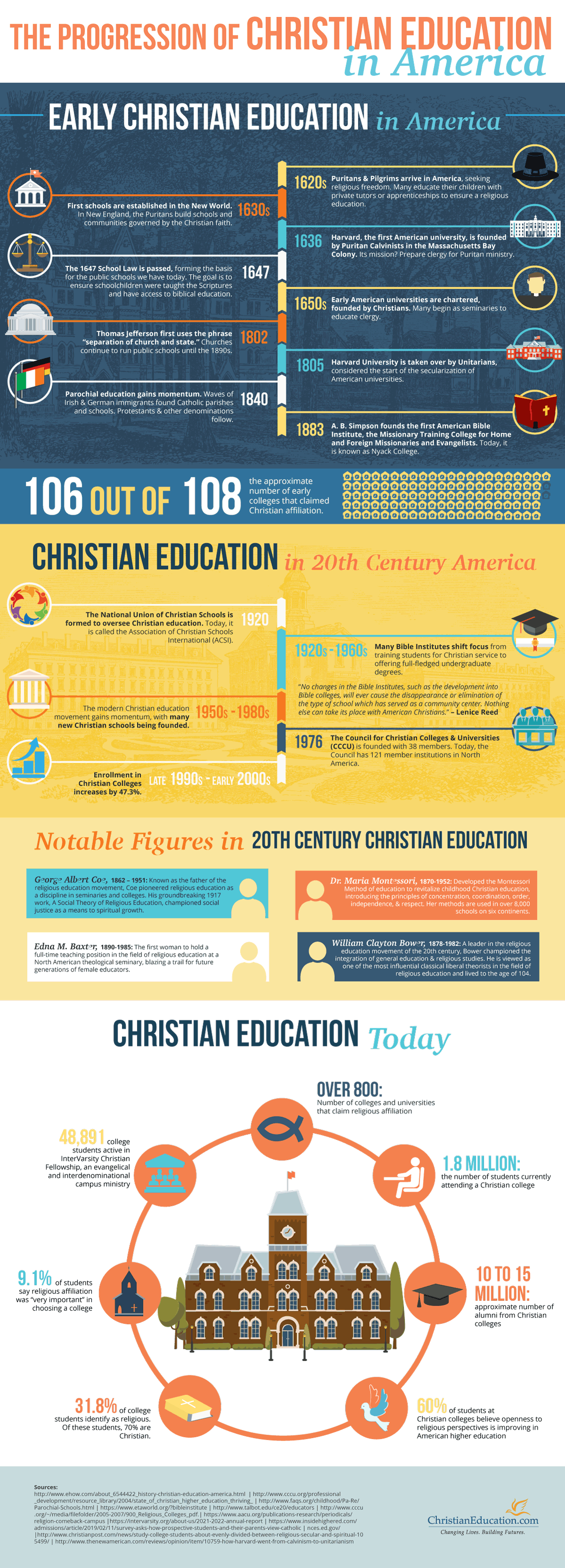Tracking the role of Christian education in the evolution of the United States is important to understanding how Christian colleges and universities came to be, but it’s also a fascinating journey for history buffs.
If you’re wondering whether faith-based higher education is right for you, you’re certainly not the first! The history of America is intertwined with the history of Christian education in this country. We’ll cover all the major highlights, and hopefully you’ll discover something you didn’t know about the origins of faith-based learning.
The Start of Christian Schools
You likely learned in elementary school that the United States began as a refuge for those suffering from religious persecution in their homelands. When the Puritans and Pilgrims came to North America in the 1620s, they were spurred by their religious convictions to settle this difficult new world. Many educated their children privately, but by the 1630s, Puritans were founding schools to spread the Christian faith. Later in that decade, Harvard University was founded as the first American university. Today, Harvard is a secular university with few religious ties to its Puritan Calvinist past, but in the 1630s, it served the important purpose of preparing Puritan clergy for their lives in the ministry!
Harvard University was not alone in its Christian origins; in fact, the majority of America’s early universities claimed Christian affiliation, and many of them began as seminaries. Over time, most of these universities moved towards secularization, with Harvard leading the way in 1805. However, faith-based education in the United States by no means died out, and a different breed of educational institution was formed: the Bible Institute. The first Bible Institute, founded by A. B. Simpson in 1883, was the Missionary Training College for Home and Foreign Missionaries and Evangelists. The school still exists today, though it is now known as Nyack College. As you may have guessed, this Bible Institute’s mission was to train students for life in Christian service, primarily as missionaries and evangelists. Unlike faith-based colleges and universities today, Bible institutes did not offer traditional undergraduate degrees… but that was about to change.
The Introduction of Bible-Focused Institutes
By the early- to mid-twentieth century, Bible institutes started to shift focus. While they still promoted Christian values and the importance of faith-based education, these schools began to transform into Bible colleges, offering full-fledged undergraduate degrees. From the 1950s onward, the modern Christian education movement picked up speed and led to the foundation of many new Christian schools.
Christian Education Today
Today, Christian education is still going strong, offering an option to college-bound students hoping to learn more about their faith while preparing for a brighter future. Organizations like InterVarsity Christian Fellowship promote interdenominational ministry and friendship, allowing students from a variety of Christian traditions to come together for a celebration of faith. Most importantly, today’s college students are optimistic that openness to diverse religious perspectives is improving in American colleges and universities, making it an exciting time to be a Christian student.
There’s no doubt that Christian education in American has come a long way. Why not become a part of this rich history by exploring what faith-based higher education has to offer?
Tracking the role of Christian education in the evolution of the United States is important to understanding how Christian colleges and universities came to be, but it’s also a fascinating journey for history buffs.
